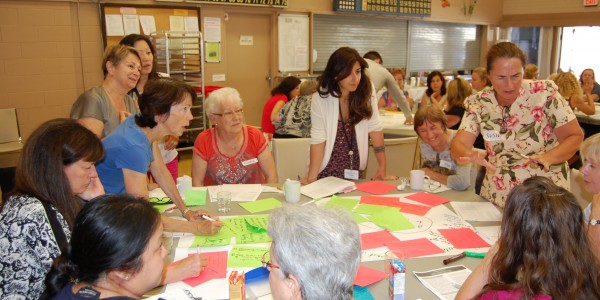Community forums tap seniors’ knowledge for new care model
According to Statistics Canada, sometime between 2015 and 2021 there will be more people aged 65 and older than those 14 and under. This is especially true on the North Shore, where the 37,000 people over 65 years of age make up almost 20 per cent of all residents. The aging demographic will be a test for B.C.’s health care system.
What is universally accepted, though, is that home is often the best place for seniors to manage their health conditions, recover from illness and live their lives. Right now, many seniors often end up in the emergency department because they can’t get the care that meets their needs in their home community.
Sharing their stories
So how do we help seniors stay in their home? It’s a good question, which is why Vancouver Coastal Health went straight to the source for ideas and answers – seniors and their caregivers.
Over the past two weeks, VCH-Coastal invited seniors, elder patients, their families, caregivers and physicians to attend three forums on the North Shore to share stories of what their care currently looks like, identify gaps in service and discuss innovative ways on how their medical, personal and social needs can be met within the community. The forums – Keeping Seniors Well – are a key part of a B.C. Ministry of Health initiative to develop a new way to care for seniors. VCH chose the North Shore as the first place to start the conversation.
We can do better
“We recognize that we can always do better in terms of the care we provide to people in our community – especially the senior population, which represents the largest group of patients in our Coastal community of care,” said Mike Nader, Coastal Chief Operating Officer, who attended the forums. “How we care for this important group of residents is fundamental to the sustainability of our health care system. In some cases, we’re using acute-care resources when there are community-based resources more in line with patient needs that would also be more cost-effective.”
Participants at the forums ranged from independent seniors who are still driving well into their 80s, bus-riding 75 year olds to seniors in residential care and spouses caring for a partner with Alzheimer’s or dementia at home. Discussions were lively and, at times, full of compassion.
Key concerns
Consistent themes that emerged from the forums include:
- Better access to resources & Information
- Improved afterhours care, services & support
- Better caregiver support/adult day program resources
- Strengthened discharge and transition supports
How they do it in Denmark
As well as canvassing seniors for input, VCH is researching best practices and literature from around the world to develop a model to improve care for seniors here. In Denmark, for example, once people hit 75 years of age, they receive two checkups a year from a public health nurse to see if they need home care or other help. The nurse also checks to make sure the fridge and medicine cabinet are stocked, whether the clients see friends and family, and whether they seem to be in sharp mental and physical health.
“Wouldn’t it be great to be proactive in that on the day a person turns 75 the health care system reaches out to them to see if there is a need for them to come to the hospital or if they need preventative measures put in place before they need a trip to the emergency department,” said Mike. “What we want to do is provide a more continuous care pathway so seniors can stay healthy and have a good quality of life living at home.”
Later this fall, VCH will share its findings from the community forums with other health authorities before finalizing any changes from this process. There will also be continued consultation and communication with the community in the coming months.


Ruth Chesson
I am very pleased to see us moving to more preventative health care measures, an essential step in reducing health care costs.